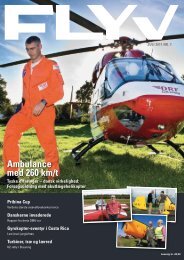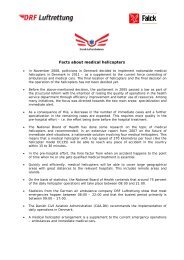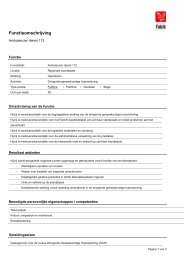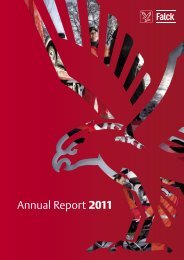Annual Report 2010 - Falck
Annual Report 2010 - Falck
Annual Report 2010 - Falck
You also want an ePaper? Increase the reach of your titles
YUMPU automatically turns print PDFs into web optimized ePapers that Google loves.
32 <strong>Falck</strong> <strong>Annual</strong> <strong>Report</strong> <strong>2010</strong> | Management review<br />
Performance by business area<br />
Assistance<br />
Revenue from the Assistance business increased 13.2% to DKK<br />
2,470 million (2009: DKK 2,183 million) and accounted for<br />
29.5% of consolidated revenue. The organic growth rate was<br />
8.0% (2009: 4.2%).<br />
Performance in <strong>2010</strong> was affected by the severe winter weather<br />
in the Nordic region, and the number of responses increased<br />
12% year on year. In Denmark and Sweden, the many extra<br />
responses had an adverse impact on profit as a large number of<br />
the customers are subscription customers, whereas earnings in<br />
Norway, Finland and Estonia increased as responses there are<br />
provided on a pay-per-use basis.<br />
In home services, more <strong>Falck</strong> subscribers needed assistance<br />
in <strong>2010</strong> when a number of heavy rainfalls in August flooded<br />
basements and caused other water damage.<br />
The good performance in the alarm market continued in <strong>2010</strong><br />
and <strong>Falck</strong> began selling alarms in Sweden. The establishment<br />
of <strong>Falck</strong> Travelcare in 2009 and the acquisition of S Reg in <strong>2010</strong><br />
increased the product portfolio in the fields of travel assistance<br />
and safety and security services for the home and contributed<br />
to the revenue growth generated in <strong>2010</strong>.<br />
The severe winter weather and the heavy rainfalls during the<br />
summer caused EBITA to fall by DKK 58 million to DKK 269<br />
million.<br />
Emergency<br />
Revenue from the Emergency business, which accounted for<br />
57.8% of consolidated revenue, rose to DKK 4,834 million in<br />
<strong>2010</strong>, equivalent to a growth rate of 13.2%. The rate of organic<br />
growth was 7.6% (2009: 11.4%) as a result of high growth rates<br />
in several markets.<br />
The emergency business in Denmark generated satisfactory<br />
revenue growth in <strong>2010</strong> as a result of a high level of activity<br />
in the ambulance business where <strong>Falck</strong> provides ambulance<br />
services to about 85% of the Danish population. Emergency also<br />
increased its sales of response services to the Assistance business<br />
in <strong>2010</strong> as a consequence of the severe winter weather.<br />
The five Danish regions increasingly use paramedics, and <strong>Falck</strong><br />
won a number of contracts for paramedic units and doctors’<br />
emergency cars in <strong>2010</strong>.<br />
Emergency in Sweden also generated satisfactory growth in<br />
revenue, especially as a consequence of the breakthrough in<br />
fire fighting where <strong>Falck</strong> now has contracts for fire services at<br />
airports and a nuclear power plant.<br />
The ambulance contracts in Norway won in 2009 were successfully<br />
put into operation in <strong>2010</strong>.<br />
Activities in Slovakia grew in <strong>2010</strong> as <strong>Falck</strong> won an additional 17<br />
ambulance stations and now operates 91 stations, equivalent to<br />
a third of Slovakia’s total ambulance service.<br />
With the acquisitions of ambulance companies Toesa in Brazil in<br />
October <strong>2010</strong>, Care Ambulance in the United States in December<br />
<strong>2010</strong> and LifeStar in the United States in early 2011, <strong>Falck</strong><br />
has obtained a significant and important foothold on the North<br />
and South American markets where the companies provide<br />
both emergency and non-emergency ambulance services. In<br />
<strong>2010</strong>, only Toesa contributed to revenue growth.<br />
The growth in activity in the Emergency business in <strong>2010</strong><br />
resulted in a satisfactory EBITA of DKK 329 million, equivalent<br />
to a year-on-year increase of 48.9%. The profit was favourably<br />
affected by an increase in the use of the response services<br />
provided by Emergency Denmark to the Assistance business. In<br />
addition, the acquisitions of Toesa and Resource Protection International<br />
contributed to the year-on-year increase in earnings.<br />
Healthcare<br />
Healthcare’s share of consolidated revenue fell to 14.3% in<br />
<strong>2010</strong> (2009: 15.1%). Revenue rose by 4.9% to DKK 1,196 million<br />
(2009: DKK 1,139 million). The rate of organic growth was<br />
minus 4.2% (2009: minus 11.0%).<br />
Healthcare in Denmark saw a drop in revenue from sales of<br />
staffing services for the healthcare sector as a number of Danish<br />
regions have increasingly decided to insource staffing services.<br />
This was to some extent offset by higher revenue in <strong>Falck</strong> Jobservice,<br />
which assists the job centres of Danish municipalities in<br />
their efforts to help people get back to work after a period on<br />
sickness benefit.
















